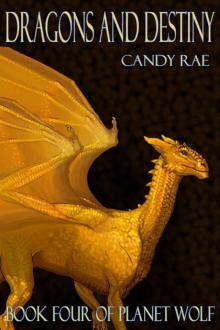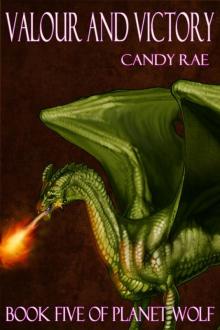Paws and Planets Read online
Page 7
“Alastair is a good man underneath all the bravado.”
Her father did not look convinced but contented himself with saying, “keep up with your singing. There’s bound to be someone on board who can take on Duguld when he’s old enough to blow a tune.”
He planted a last farewell kiss on his daughter’s forehead then bent down to gaze at his sleeping grandson. One knurled finger stroked his cheek but the baby didn’t stir.
“Time for you to go,” he murmured.
When he raised himself from gazing at Duguld his eyes were bright with unshed tears.
The old man watched as his daughter lifted up the carry-cot in which his beloved grandson slept and followed her husband up the gangplank and on to the shuttle that would take them to the orbiting space-station where the World Coalition Colony Ship Argyll lay at berth, ready to leave for her twenty year journey to Riga.
The elder Duguld never learnt about the true fate of his family, nor of how his grandson would survive the disaster that would overtake the convoy.
The silver trumpet and the young man who would play it would become famous.
The baby boy who slept in his cot as planet Earth disappeared from view would learn how to play his grandfather’s trumpet and would carry it to a war the like of which was beyond his grandfather’s wildest imaginings.
For the war would be fought not on planet Riga but on an as yet un-named planet light years away at the other side of the galaxy where on a beleaguered hilltop the trumpet would call out to all who could listen of both joy and deliverance when all hope was dying.
* * * * *
POEM 1 -TRUMPET’S CALL
Written by Tara Sullivan-Crawford (AL -12 to circa AL 55) after the deaths of Duguld McCallum and his Lind, Ganya. Duguld and Ganya were friends of Tara and Kolyei. He married Tara’s adopted sister Violet, the eldest daughter of Janice and Winston Randall.
I was silver once, pristine, new, my tone so sweet, no matter who blew. Now my gilding is tarnished, my valves all worn, I sit on a shelf, forgotten, forlorn. I came from a world light-years away, where for time uncounted my owners did play. In orchestras, bands, groups and quintets, in these times I played marches and minuets.
My tone was true, my descant sound, my low notes reverberated, my highs truly round. On Rybak I belonged to a boy, Duguld was his name, and diligently he practised, my voice to tame. Even when he became one of the vadeln-pairs, he managed to play some quite credible airs. I became dented in places as we travelled to and fro, I sounded in the mountains, amongst lands high and low.
It came to pass that war came to the north, the call went out that the Vada go forth.
We rode fast to where the Larg would invade, ashore through the sandy wallows they would wade. The ryzcks were encircled at a hill called David’s Keep, where against the walls Larg kohorts did leap. All hope was dying and death seemed near, when Duguld placed me to his lips to help overcome fear.
The Lindars heard me as they ran south and west, as he blew me loud with both vim and zest. That night before battle, he played long and slow, as our rescuers rested by their red campfire glow. The Larg they too listened through that long night, and wondered greatly as dark turned to light. The battle commenced and brave did the north fight, to defeat their enemy come what might.
All through that long day of pain and death, I sounded out each moment Duguld had breath. Then the battle was won, the north victorious, the war was over, Larg defeat inglorious. Tails between legs they fled back to the south, the taste of defeat in each mealy-nosed mouth. I then sounded out with much joy and sadness too as Holad and medics counted the cost of the madness.
And those who fought that blood-filled day, remembered my sound loud over battle’s bray. The victory was named after me whom Duguld blew, when all courage was dying to give hope anew. These days are long past now, my Duguld gone, to the blue pastures where celestial song. Rings out for the dead, who battle no more, but I may not go there, my voice not to soar.
For I am an object of silver and brass, I must stay here and watch my Duguld pass,
My gilding is tarnished, my valves all worn, so I sit on a shelf, forgotten, forlorn.
Although there have been a considerable number of Tara Sullivan-Crawford’s poems and rhymes published, Tara always described her ‘poetry’ as of ‘no account’. The Professors at the University of Stewarton in Argyll appear to agree and her poems are never studied by any of their students. Her songs and rhymes are however very popular amongst the general population, in Vadath especially but also in Argyll, the Islands and even amongst those of the Kingdom of Murdoch.
* * * * *
EPISODE 2 - STORM
There was a thunderous crash as the space-cold rock smashed into the outer skin.
The shock of the impact resounded in everyone’s ears and reverberated through the deck plates. The giant wave of space debris was moving so fast that there had been no time for the proximity sensors to react.
On the command bridge of the WCCS Argyll, the Senior Duty Officer, Commander MacIntosh, shut off the warning klaxon. As he slammed his fist down on the override switch, there was a resounding bang, louder than that of the initial impact. He glanced at his console, it was a sea of flashing, warning lights.
“Damn,” he swore. “Must have hit something. What was it?”
The status reports came in loud and fast.
“Airlocks shut.”
“Livestock section pressure falling.”
“Hull breach in sections five and nine.”
Commander MacIntosh grimaced. Sections five and nine were colony sections, packed full of families.
“Sensors are picking up more incoming sir, approaching us at four klicks per second.”
A voice from the signals rating at the communications console piped up, “WCCS Oklahoma has gone, sir.”
He raised a disbelieving face towards the speaker. Surely he couldn’t have heard that right? “Gone?”
“Yes sir. She’s just blown up.” The rating’s voice sounded as if she couldn’t believe what was happening either but now Commander MacIntosh realised the full extent of their danger. This was a major catastrophe.
“Where is the Captain?” he asked in a voice heavy with tension.
“Don’t know sir,” answered white-faced Kath Andrews, responsible for life support this shift. She was desperately trying to ascertain the damage to their vital oxygen supplies.
“Now the Latvia has disappeared off the scope sir, and the sensors are not picking up the Electra either. The Melbourne is reporting damage.” The signal rating’s voice was shrill.
There was a moment of stunned silence.
Stuart MacIntosh paused for an instant before turning to his control board. His thoughts were racing. The WCCS Latvia and the WCPS Electra? What is happening to us? The Latvia was the flagship of the convoy, there were old friends on board, but right now the Commander had far more urgent things on his mind, such as his own ship’s survival and that of his shipmates.
He felt the crunch as the WCCS Argyll impacted with more space-flotsam churned up by the storm. She juddered for a moment then turned turtle before starting to spin, slowly at first then faster and faster. The bridge crew lost consciousness as the emergency lights blinked out.
The maelstrom, if that’s what it was, picked up the ship and carried her off as a wind might pick up a stray leaf. Carried by its vortex, the WCCS Argyll progressed through the vastness of space at a speed faster than could be imagined and for an unaccountable distance. Then, as a cat might bat away an annoying fly, the capricious maelstrom flicked the WCCS Argyll away. Separated from the whirlpool of fast moving debris, the ship began to lose speed. In the great darkness of space she drifted, silent and alone.
* * * * *
There was a chime as the emergency computers kicked in. As designed, they performed the automatic start up and emergency diagnostic programs, then checks completed, restored power to the operational areas.
Kath
Andrews was the first on the bridge to regain consciousness. She winced at the excruciating stab of pain in her wrist as she pushed her body upright. “Broken,” she muttered and managed to pull herself into her chair. She realised that there must be power coming from somewhere, the gravity was working and the lights were on.
She took a deep breath to steady her nerves and gazed at the scene before her. Under the muted red glow of the emergency lights she did not see the devastation she had expected to see. Admittedly, the bridge crew were scattered (unconscious or dead – she wasn’t sure which) around the deck, but there did not seem to be any structural damage. Lights flashed, consoles bleeped and there was a smell of burning electrics. The automatic foam dispensers had extinguished incipient fires.
“Anyone else awake?” she called out in a hopeful voice.
There was no answer but her blue intercom light was flashing. Slowly and deliberately she pressed the toggle with her good hand. A thin, reedy voice crackled over.
“Is that the bridge? Aft Crew Deck here, Chief Petty Officer Lutterell.”
The voice was calm, assured.
The relief in Kath’s voice was palpable as she quavered the regulatory answer, “Andrews here sir.”
“What is our status?” asked Robert Lutterell.
His question was uttered as if nothing untoward had happened. The senior non-commissioned officer on the ship, recognising the stark terror in her voice for what it was, knew this was the approach Kath needed. One didn’t become the CPO of a World Coalition Space Vessel without knowing how to handle crew in all manner of difficult situations.
Her voice became stronger as she answered, responding to his tone.
“There’s only me sir. What am I to do?”
“Check the bridge crew then start on the damage report.”
“Damage report?”
“Yes Andrews. The Damage Report. We’ll be there as soon as we can.”
The knowledge that there were others alive elsewhere on the ship gave Kath the determination to do her duty so she replied, “Aye Chief,” and cut the connection. She turned towards Commander MacIntosh and knelt down by his side.
* * * * *
One deck below, the grim faces of the crew who had been off duty when the storm struck looked at each other.
Petty Officer Cranston summed it up.
“It looks bad. Wonder if any on the officers’ deck made it.”
Rating McAllister shrugged his shoulders.
Robert Lutterell looked at him sharp-eyed. McAllister was a bit of a hard egg, being convinced that the majority of the commissioned ranks were a complete waste of ship’s air. The rating spent the majority of his off-duty time in trouble for one reason or another and had been released from his last spell in the brig only the previous day. Robert vowed to keep an eye on him. “Crew family quarters intact?” his voice barked out in its usual authoritative manner.
“Yes sir,” said Jim Cranston, “missed by a mile.”
This was the answer the CPO was looking for. Now the crew would concentrate on their duty, knowing that their families were not in any immediate danger.
The men and women, some one hundred and sixty strong, clustered round him.
“We must get to the bridge,” said Robert Lutterell, “can’t do anything from here.” He pointed to his left. “Up that shaft.”
Everyone looked at the access shaft door, shut fast and the opening mechanism dead.
“Need a power wrench,” called someone from the back.
“Go get one.”
“Aye Chief.”
“I’ll take ten up the shaft with me.”
He caught Petty Officer Cranston’s eye.
“Choose the team,” he ordered, “Make sure all the bridge functions are covered.” Then he turned to the rest of the crew, “Get your equipment together. Expect rescue missions in any of the sections that have survived. Sick bay attendants prepare a suitable area in case of wounded. Use the off-duty lounge and the cabins.”
Petty Officer Cranston chose the rescue team and began to brief them. The rest peeled off to their duties. There was no panic.
No substitute for decent training, thought Robert Lutterell as he watched.
The power wrench arrived, carried by a sweating McAllister and the team set to work on the shaft door.
It took them over two ship hours to reach the bridge. Two hours of backbreaking labour as they manhandled the shaft doors open then painstakingly climbed, using the lift clamps for purchase. Climbing up behind the heels of his superior, not for the first time Petty Officer Jim Cranston wished that the ship designers had seen fit to install a ladder in these shafts. Not five months previously he had been inside a similar one extricating a gaggle of colonial youngsters from a stuck lift. It had been hard going then; it was even more so now.
He grimaced as he stubbed his toes for the umpteenth time and wondered how these self-same youngsters were coping with this emergency and for that matter, if any had survived.
Kath Andrews was waiting at the shaft door (she was listening out for their approach) and helped the CPO wedge it open, starting her recitation of the status report. Robert Lutterell knew that behind him, Jim Cranston was listening hard as well, although all he could hear from below was Jim’s heavy breathing caused by the exertion of the climb on his stocky, and it had to be admitted, overweight frame.
So when Robert Lutterell managed, with a grunt of effort, to hoist his leg on to the bridge floor and pull himself up, the CPO was fully aware of the situation and able to take charge at once, to young Kath’s heartfelt relief.
He strode on to the bridge, eyes taking in everything. Of the eight who had been on duty, two were dead and four were lying to one side, unconscious and rough-bandaged, mute evidence of the effect the storm had had on the bridge crew. Elsewhere on the ship the deck ceilings were low. On the bridge, bodies had impacted high on the bridge up-deck, over three metres above the foot-deck. It was no wonder there had been deaths and broken bones.
Commander MacIntosh was conscious, but only just. Propped up by Kath in his command chair, he was doing his best to bring order out of chaos. It was obvious to Robert that he was not able for the task. Robert Lutterell put out a large gnarled hand and grasped the Commander’s shoulder. The officer jumped at the touch then with obvious difficulty turned his head to see who it was. His eyes tried to focus on the burly shape in front of him.
“Chief? Is that you?” his words faltered.
“That’s right sir. Now you let some of my boys take you over with the others. Lie down and have a rest. You’ll be much more use once you’ve had a doss. I’ll take charge here.”
Stuart nodded slowly, trying to minimise the agony that reverberated in his head and Robert turned his attention to young Kath who was standing at his side. She stared at him with an expression that spoke of checked panic.
“I’m here now, and it’s going to be okay,” he said to her.
She nodded and a faint colour returned to her pale cheeks.
She must only be around seventeen; born on Earth but shipboard since she was five or thereabouts. Still, she has kept her head remarkably well.
He cleared his throat.
“Now Rating Andrews. I have a job for you to do. An important job. You are life support, aren’t you?”
Kath nodded again.
“Right. You must find out if there are any problems with life support. Find out the areas where the systems are intact, damaged or not working at all. Think you can do that for me?”
“Yes,” she answered yet with quiet confidence in her abilities.
He was pleased to see the girl return to her duty station and begin her task.
As he watched her settle herself at the life-support console he noticed the way she was favouring her right arm.
“And see a medic about a pain-block.”
Kath raised her good arm in reply. She would do just that when the medic was finished with the more critically injured.
&n
bsp; As the rest of the team arrived he allocated them to their duty stations. Jim Cranston he sent to damage control, the next rating to engineering, thanking whatever stars were lucky that those in the group would be able to cope with whatever he asked of them.
When the sick bay attendant arrived he ignored the CPO’s attempts to direct him towards Kath and went straight to the group of injured figures lying on the deck. He examined them with much tut-tutting and exclamation.
Chief Lutterell bit back a grin as he sat down in the duty bridge officer’s seat vacated by Commander MacIntosh and looked at the flashing screens before him. His heart sank into his ship-boots at what he saw. Things did look bad.
A metre away Petty Officer Cranston frowned as he began to hunt out the information concerning the full extent of the damage to the ship. As his fingers moved over the keypad, his eyes assessed the screen. He realised that although the ship was grievously wounded, all was not lost.
Engineering was intact, as were all but two of the colonists’ living sections. These areas were write-offs as far as he could see with little or no possibility of survivors, both outer and inner hulls having suffered a major breach. A veteran of space travel, Jim Cranston knew that anything not bolted down in these areas was now floating in space, mega-miles from the ship.
One of the surviving colony sections had suffered damage but rescue teams made up of crew and colonists from the adjoining section were working on it.

_preview.jpg) Ephemeral Boundary (T'Quel Magic 1)
Ephemeral Boundary (T'Quel Magic 1) Wolves and War
Wolves and War Ambition and Alavidha
Ambition and Alavidha Homage and Honour
Homage and Honour Conflict and Courage
Conflict and Courage Dragons and Destiny
Dragons and Destiny Valour and Victory
Valour and Victory Paws and Planets
Paws and Planets